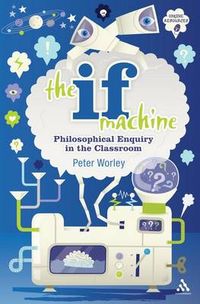
The If Machine
This is a practical resource packed with 'philosophical thought experiments' - imaginary situations designed to test an idea or intuition though profound thinking. Can computers think? What makes something human? How big is infinity? From Sartre to Searle, this practical book is rooted in accepted philosophical theory, and introduced at a level suitable for children. Each chapter offers an imaginary situation, followed by a series of questions to encourage children to question key philosophical ideas such as values and ethics, gender and identity, existence and beauty. All the thought experiments have been tried-and-tested in the primary classroom, and a handy star system is included to indicate the difficulty level of each one, enabling quick ability differentiation. With a comprehensive introduction, key sections on the philosophy behind the experiments, this book also includes an online teacher's resource to guide them through using the stories to best effect in the classroom. Invaluable as a resource for P4C trained teachers, this book is also perfect for primary teachers with no previous grounding in philosophy who want to introduce higher order and critical thinking in their classroom.
Utgiven: 2010
ISBN: 9781441155832
Förlag: Continuum Publishing Corporation
Format: Häftad
Språk: Engelska
Sidor: 144 st
This is a practical resource packed with 'philosophical thought experiments' - imaginary situations designed to test an idea or intuition though profound thinking. Can computers think? What makes something human? How big is infinity? From Sartre to Searle, this practical book is rooted in accepted philosophical theory, and introduced at a level suitable for children. Each chapter offers an imaginary situation, followed by a series of questions to encourage children to question key philosophical ideas such as values and ethics, gender and identity, existence and beauty. All the thought experiments have been tried-and-tested in the primary classroom, and a handy star system is included to indicate the difficulty level of each one, enabling quick ability differentiation. With a comprehensive introduction, key sections on the philosophy behind the experiments, this book also includes an online teacher's resource to guide them through using the stories to best effect in the classroom. Invaluable as a resource for P4C trained teachers, this book is also perfect for primary teachers with no previous grounding in philosophy who want to introduce higher order and critical thinking in their classroom.
Begagnad bok (0 st)
Varje vecka tillkommer tusentals nya säljare. Bevaka boken så får du meddelande när den finns tillgänglig igen.



